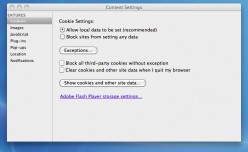3 Wishes for Answers to 3 Questions
While browsing the internet and writing it occurs to me that certain things I cant seem to not think about. I am not worried but I wish I knew the answer to these three questions.
Can someone please explain the anatomy of cookies thoroughly? Are cookies dangerous and do they / can they act as spyware reporting back to the website that made them?
What is the max number of unpublished hubs I can have?
How do you hyperlink different phrases to go to different parts of the same page?
Thanks in advance for any information.1. A cookie contains information that the website wants to store with regard to you. It's stored on your computer so that the information is available to the website next time you visit. It's not dangerous but they can be used to track what you're doing. You can think of them as little text files with information. There's a lot more information about cookies on the internet though - have a look if you're worried.
2. There is no limit that I am aware of. Having many unpublished hubs may affect your personal author score but I don't know if that is the case and to what extend.
3. You can link using #. A link that contains a # links to a particular part of a webpage. It's a bit technical but that can only be done when that particular spot on the webpage allows you to link to it. Here's an example of such a link: http://hubpages.com/forum/topic/62497#post1379112 I don't think it's possible to do it for parts of a hub but I could be mistaken.I thought you were kidding at first, because the only cookies I could think of that have "anatomy" were gingerbread men.
Cookies in and of themselves are conveniences and generally do not present a risk. Use your browser to clear all your cookies from time to time. This will cause some inconveniences such as stored passwords, site preferences, etc. I clear my cookies all the time, because I do not want them, but I recommend keeping cookies for my elderly relatives because they use the same webpages generally and putting in user names and passwords for them is very difficult each time. I prefer to enter them all each time, because I want to make sure that I know them all.
As far as I can tell, there is no max on the unpublished hubs, as a matter of fact, some of the hub contests recommend writing many hubs for release during the hub topic month. The most recent is on Personal Finance.
You cannot link to other parts of the same page, links are to URL's. However, there is a clever way to make a Table of Contents and it is clearly laid out in a hub by Darkside: http://hubpages.com/hub/tableofcontents This method works to jump down the page. Personally, I don't take the time to do this, but you might find it interesting enough to use it.That's not true and the hub you're pointing to describes that it can be done. Any link is a URL but there's no requirement that the URL must differ from the current URL. By using # you can link to an other part of the same page. In HTML these are called named anchors.
You are correct, in reviewing what I said, I meant to say something completely different. Fortunately, the hub I pointed to does explain it elegantly. It takes an "edit" to accomplish the task.
It is a little technical as you pointed out. But Darkside has made it possible to understand without knowing html, which as you might have guessed, I know very little.
Thank you for correctly pointing out my error.No worries, it can be confusing when web terminology includes a link, URL and URI that all sound the same but they are not.
Actually, there are two kinds of cookies and it can be useful to understand the differences.
Let's say you visit WaltsWorldOfStuff. That site may create a cookie that has information about your visit. It's likely you want that cookie because it is helpful to you.
However, there are also Google Ads on that site and those ads can create a different kind of cookie - a third party cookie. When you leave WaltsWorldOfStuff and go to SamsWorldofWonder and then to BillsWonderfulWorld and finally end up at WillysReallyWonderfulStuff, if all of thoe sites run Google ads, Google could know where you have been and what pages you looked at. WillysReallyWonderfulStuf has no idea that you went to all those other places, but Google could.
They are not dangerous, but they are why an ad for ski vacations shows up on the muffin site if you have previously visited a few travel sites.
You can specifically disable these third party tracking cookies in most browsers. Here's what that looks like in Chrome on my Mac:
See the "Block all third party cookies without exception" ? That's the kind that Google and other advertisers might use.Thanks for taking the time to help Pcunix, Simeonvisser, and SteveoMac.
Ok from all your explanations of the cookie is that it is fine to have cookies. The only thought I had about those cookies was "oh no someone can make something that can take all my information and report it to the original website." But you all state that it is fine because the original website that the cookie was made on does not obtain passwords and usernames from other websites you visit. Correct me if I am wrong.Great information here, thanks everyone. It's nice to learn something new!
I used to delete cookies regularly, but it became a real chore and not really worth the effort. My privacy wasn't really compromised, I was just paranoid. Also, I was cutting off the tasty cookies that made entering forms so much easier. (I do a lot of that!) When I start getting overwhelmed with spam ads I'll worry about cookies, until then, let em ride.
Related Discussions
- 58
I could use some advice, here
by Liz Elias 8 years ago
While I opted out of the Hub Pro program, it would be irrelevant, anyway, since they are only focusing on already well-trafficked hubs.I could, however, use some advice on what I need to fix on this one, which has fallen into the "unfeatured for lack of traffic" hole.I thought it would be...
- 93
Post a Clear List of What's Not Allowed, Please
by Kate Swanson 12 years ago
Whether I agree with HP's new policies or not, I respect the site's right to set their own rules. However, I think one of the reasons Hubbers are getting upset isthey're getting warnings based on rules they don't know existExamples:1. I have "overly promotional" warnings on several...
- 146
Prohibited sites based on crtieria not a master list
by sunforged 12 years ago
This is getting ridiculous, well, it has always been ridiculous.What is so damn hard about making a list of sites you consider prohibited?What is so damn hard about making a list of sites you consider prohibited?What is so damn hard about making a list of sites you consider prohibited?What is so...
- 20
KNOWN ISSUE: 410 Crawl Errors in Google Webmaster Tools
by Blake Flannery 11 years ago
This is just one example of many errors showing up in Google webmaster tools that appear to have category information added into the url of my hub creating a link to a non-existent hub. In the link below, "/family-and-parenting/kids/" is the part that I think may be creating the...
- 17
Making Hubs from the Question-Answer Section
by Billie Kelpin 9 years ago
So, I understand that the question-answer section is to inspire hubs, BUT it feels a little disingenuous to use the information everyone provided, especially when that information would fit nicely in a list. I asked a question about recipes and received lots of great replies. How do I make a...
- 23
Photo's in Hubs: Can We Seek Out Photographer's Permission?
by Jess Brazeau 10 years ago
Hello!So, I know there's always a lot of questions about how to provide proper credit when using someone else's photograph's in your hubs. I had a little bit of free time this afternoon and re-read some of the Learning Centre's Information about using photo's in your hub (To my horror, I may have...












